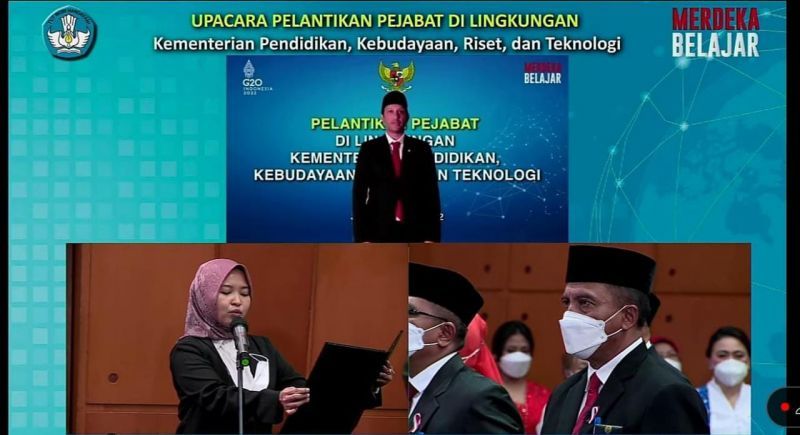
www.unesa.ac.id
Unesa.ac.id, SURABAYA- Prof. Dr. Nurhasan, M.Kes, officially returns to lead the State University of Surabaya (UNESA) for the next four years, the period 2022-2026. Together with a number of other Kemendikbudristek environmental officials, Cak Hasan (his nickname) was appointed and inaugurated directly by the Minister of Education, Culture, Research and Technology (Mendikbudristek), Nadiem Anwar Makarim, B.A., M.B.A., in Jakarta, on Thursday, June 30, 2022.
On that occasion, Nadiem Makarim reminded all officials that the oath he had just taken contained responsibility for the nation and state of the Republic of Indonesia, responsibility for maintaining Pancasila and the 1945 Constitution and responsibility for the intelligence and welfare of the people. "I am sure that you have high enthusiasm to be at the forefront of the Independent Learning and Independent Campus (MBKM) program," he said.
Currently, the Ministry of Education and Culture has released 21 independent learning episodes that touch all levels of education. The transformation of the education system to accelerate the quality of learning is a major goal of the independent learning policy. All efforts made must be based on efforts to meet the needs of students for quality and relevant education. Equitable access to education for children throughout Indonesia is the key to the success of independent learning.
"The Chancellor of UNESA and other campus rectors can continue the higher education climate that spurs creativity and innovation by implementing the MBKM program on campuses that you lead," he hoped.

www.unesa.ac.id
After the inauguration, Cak Hasan thanked the Ministry of Education and Culture and the UNESA academic community for giving back the mandate to lead UNESA in the future. According to him, carrying out the mandate is not easy. However, with the support of all parties, UNESA can demonstrate its quality at the national and even international levels. "In the future, of course, the achievements so far will continue to be improved both at the national and world levels. This is in accordance with the vision that I conveyed some time ago, which is to create PTNBH UNESA that is strong, adaptive and has an international reputation,” he said.
In recent years, UNESA's reputation has skyrocketed. The quality has increased sharply. Brilliant achievement. In terms of infrastructure, it is progressing. Various buildings and facilities were successfully completed, such as the rectorate, student center, graha unesa, postgraduate, doping laboratory, art and design building, FEB building, and UKM center. Those currently in process are the Biology building, Language and Arts Building, Sport Science Integrated Laboratory, integrated parking, sports medicine building, sports psychology building, and PSDKU Unesa Magetan campus.
Several programs and developments as well as other targets in the future, said Cak Hasan, will continue to be achieved and achieved. National and international rankings were also increased through several missions, including; improve the implementation of academic, vocational, professional education that is superior, creative, adaptive, and collaborative to produce human resources with competitive and character; improve the management of higher education institutions that are transparent, accountable, participatory, and adaptive based on entrepreneurs, and improve the quality of creative and adaptive human resources in order to realize quality academic and non-academic services.
In addition, increasing income generating in the context of implementing the tridharma of higher education and the welfare of the Unesa civitas; increasing domestic and foreign networks and cooperation; increasing innovation in the context of developing competitive and reputable universities, and increasing the quantity and quality of infrastructure and the realization of an entrepreneurial education-oriented campus (Edupreneurial University) towards independent and globally competitive universities.
"I have outlined this mission in 22 work programs ranging from KKNI and OBE-based curriculum for all study programs, improving the quality of academic, vocational, and professional services, increasing cooperation both at home and abroad, to improving academic culture and developing human resources through further studies and training," he concluded. [UNESA PR]
Share It On:






